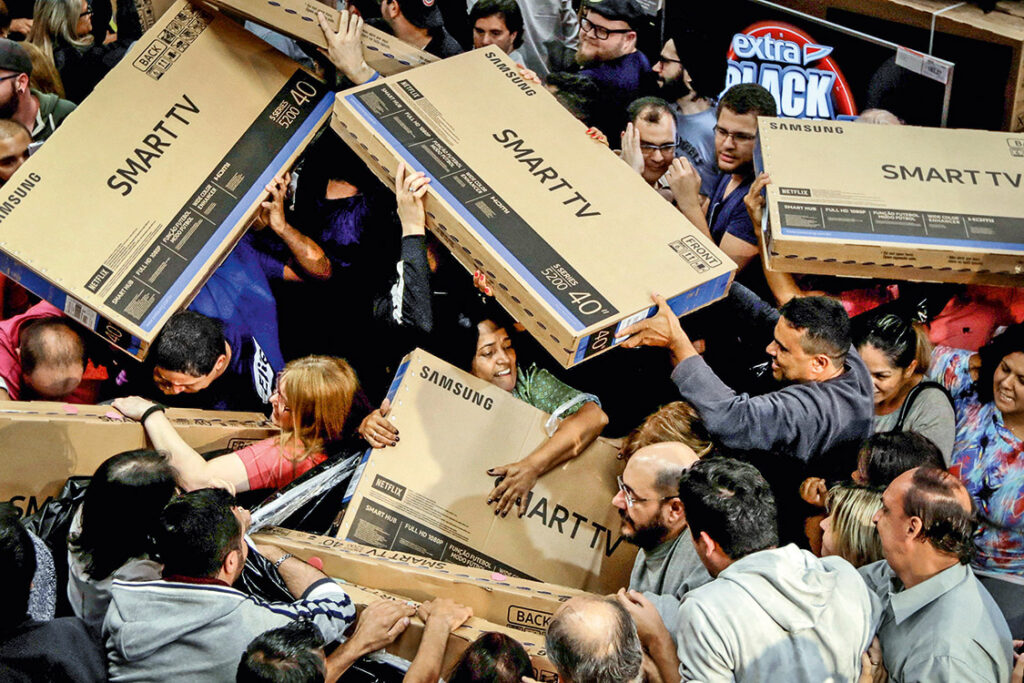RIO DE JANEIRO, BRAZIL – Black Friday week sales this year were 30% higher than in 2019. According to a Nielsen survey, e-commerce invoiced R$6 billion between November 19th and 27th. The period includes both the “Esquenta Black Friday” (Black Friday Warm-up) as well as the official date of the event, Friday, November 27th.
Although retailers had gambled on diluting the main promotions throughout the “warm up”, turnover is still centered on the main day. November 27th accounted for 53% of sales, against 51% last year.

Julia Avila, Ebit|Nielsen leader, says that the extended promotions period will be a trend for the upcoming editions.
“E-commerce and people used the whole month of November to find good prices and make good deals. This shows that a stronger Black Friday is a trend for the upcoming years”, she says.
According to Nielsen’s assessment, the concentration of sales on Friday causes retail to lose dynamics, because it mobilizes more infrastructure and employees over a short period.
“With longer periods, trade becomes more profitable and may pass through better discounts on prices. Everyone profits at the end of the day,” she says.
There was also an increase in the post-Black Friday sales compared to 2019. Combining Saturday and Sunday, November 28th and 29th, e-commerce invoiced US$1.5 billion in sales, a 27% increase compared to the same period last year. The weekend performance was similar to Thursday and Friday, November 26th and 27th.
During the Black Friday preview, projections suggested that changes in consumer habits acquired during the pandemic would introduce new trends to the event. According to Juliana Avila, “e-commerce knew how to seize the moment and attract them with discounts, opportunities and attractive offers.”
According to Fernando Gamboa, partner of KPMG, the extension of Black Friday “warm up” allows consumers more time to decide on purchases, which reduces the number of impulse purchases and allows consumers to plan and anticipate Christmas shopping.
“This Black Friday is very atypical. Consumers are financially stressed, but have the opportunity to anticipate Christmas shopping and shop less on impulse,” he said. “We don’t want excessive consumption during a pandemic.”
This year, on Friday, November 27th alone, the event’s official day, online shopping revenue totaled R$3.1 billion, a 4.8% increase compared to the same day last year. In addition to spending 7.8% more – the average purchase amount on Friday this year stood at around R$679 – Brazilians also bought more often, processing 4.6 million purchase orders.
Summing up the total purchases of the event’s main day and the so-called “Black Friday Warm Up”, 10.6 million orders were processed this year, approximately 20% more when compared to 2019.
According to Gamboa, Black Friday’s shopping activity could impact this year’s Christmas shopping and lead trade to reconsider its traditional January sales.
This year’s Christmas performance is expected to be insufficient to boost trade recovery throughout 2021. Experts say uncertainty over the pandemic and how the economy should react should still impact year-end sales.
New habits, old complaints
On Monday, November 30th, Procon-SP (consumer protection) recorded 940 Black Friday-related calls. The main consumer complaint was related to inaccurate prices (139), when the discount offered is not real, followed by complaints against canceled orders after the purchase (109), price changes at the end of the purchase (107), product or service unavailability (101) and delivery failure or delay (89).
Source: Folhapress

